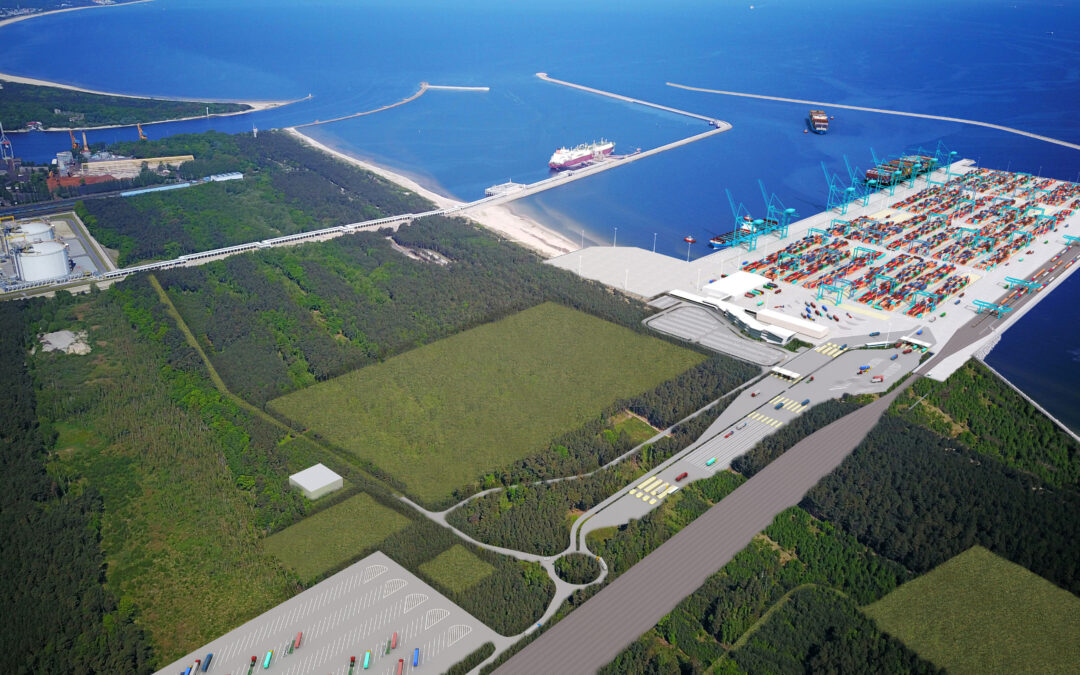The Polish authorities have signed a contract with a Belgian-Qatari consortium to finance, construct and operate a planned new deep-water container terminal in Świnoujście on the Baltic coast.
The Polish government wants the project, which will cost billions of euros to develop, to create “a serious competitor to Hamburg”, currently the busiest port in the region.
Poland will invest 10 billion zloty (€2.1 billion) in developing a container port in the city Świnoujście that can "within 6-7 years become a serious competitor to Hamburg", says a deputy infrastructure minister https://t.co/G9eR2cLfX8
— Notes from Poland 🇵🇱 (@notesfrompoland) April 4, 2023
This week, the port authority for Świnoujscie and the nearby city of Szczecin signed the contract with Belgium-based Deme Concessions and Qterminals of Qatar.
“This is an investment that will provide a development impulse not only for Świnoujście and the Western Pomerania [region], but also for the entire national economy,” said the president of port authority, Krzysztof Urbaś.
The expansion of the port is intended to enable the reception of large container ships and is seen by the port operator and Polish national authorities as necessary to cope with growing container demand.
The new terminal, which is expected to become operational by 2028, will ultimately have an annual capacity of 2 million TEUs (the unit used to measure container cargo capacity) compared to the 8.3 million TEUs that passed through the port of Hambourg last year.
📣Powstanie głębokowodny terminal kontenerowy w Świnoujściu. 🌊
🏗Nowy terminal w południowo-zachodniej cz. Morza Bałtyckiego to odpowiedź na rosnący popyt dla ładunków kontenerowych.🌊
➡Docelowo obsłuży do 2⃣ mln TEU rocznie.👉https://t.co/mbvsrScCOb#Przeładunki #Terminale pic.twitter.com/NUtuCcv3ys
— Ministerstwo Infrastruktury (@MI_GOV_PL) July 10, 2023
The port will be able to simultaneously service two ships, one with a length of 400m and one of 200m. As well as civilian shipments, it will also be able to handle military cargo, a crucial aspect since Poland became a transportation hub for military aid to war-torn Ukraine.
However, as well as building the terminal itself, work will need to be undertaken to create a new access route to the port. The existing entry route, which runs partly through German waters, would have had to be deepened and extended, but that idea was opposed by the German authorities.
To avoid this problem, Poland decided to create a new approach, around 60 km long, which will cost an estimated 10.3 billion zloty (€2.3 billion) to develop. Those costs will be covered by the Polish authorities, while the estimated 2 billion zloty cost of developing the terminal itself will be covered by the contractor.
A planned "mega port” at Świnoujście in Poland is touted by the Polish government as offering benefits for the entire region.
However, the environmental implications are threatening to cause a rift between Germany and Poland, writes @_EmergingEurope https://t.co/RsMImp8Uer
— Notes from Poland 🇵🇱 (@notesfrompoland) March 2, 2021
Main image credit: MI (under CC BY-NC-ND 3.0 PL)

Alicja Ptak is deputy editor-in-chief of Notes from Poland and a multimedia journalist. She has written for Clean Energy Wire and The Times, and she hosts her own podcast, The Warsaw Wire, on Poland’s economy and energy sector. She previously worked for Reuters.




















